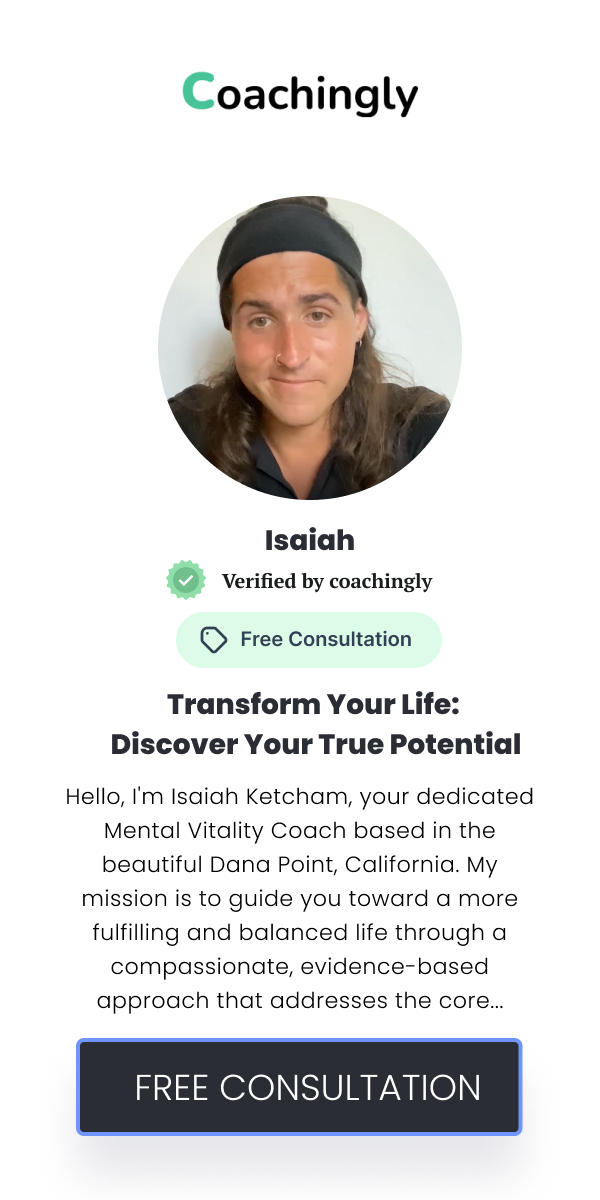
Rebuilding After a Toxic Divorce: Steps to Reclaim Your Life and Thrive
Isaiah Ketcham
![]() August 14, 2024
August 14, 2024
The emotional and psychological toll of a toxic divorce is profound and far-reaching. The end of such a relationship often leaves individuals grappling with feelings of inadequacy, betrayal, and intense sadness. Recognizing the gravity of these emotions is a crucial first step in the healing process. It's important to give yourself permission to feel and process these emotions rather than suppress them. Understanding that these feelings are a natural response to the trauma of a toxic relationship can provide comfort and clarity. Acknowledging the impact helps in validating your experience, making it easier to address and work through these emotions. This recognition sets the stage for a more focused and effective recovery journey. Navigating the aftermath of a toxic divorce can be challenging, making professional guidance invaluable. A relationship coach or therapist plays a critical role in helping you manage emotional trauma and regain your sense of self. They offer a structured approach to healing by providing tools and strategies tailored to your unique situation. Therapy can offer a safe space to explore your feelings and develop coping mechanisms, while a relationship coach can help you rebuild your personal life and relationships. Finding the right professional support involves considering their qualifications, experience, and approach to ensure they align with your needs. The right guidance can make a significant difference in your recovery, providing both support and actionable steps to move forward. Investing in professional help is a proactive step towards a healthier, more fulfilling life. After a toxic divorce, rebuilding self-esteem and identity is essential for personal recovery. The process starts with acknowledging and addressing any self-doubt or feelings of worthlessness that may have developed during the relationship. Engaging in self-discovery can help you understand your strengths, values, and passions, which may have been overshadowed in the past. Setting personal goals that reflect your true interests and aspirations can further bolster your self-confidence. It's important to engage in activities that reinforce your sense of self-worth and provide a sense of accomplishment. Creating a new identity involves shedding old, limiting beliefs and embracing a future filled with potential and personal growth. This transformation is key to moving past the negativity of a toxic relationship and forging a positive path forward. Setting and maintaining healthy boundaries is crucial in the aftermath of a toxic divorce. Boundaries help to protect your emotional well-being and prevent further manipulation or stress from your ex-partner. Establishing clear limits about communication and interaction is essential for maintaining your mental health. Effective communication of these boundaries requires assertiveness and clarity, ensuring that your needs and limits are respected. Implementing these boundaries can also involve physical and emotional distance, helping you to focus on your recovery. Boundaries are not just about limiting interactions but also about creating a safe space for yourself to heal and grow. Properly managed boundaries can significantly contribute to your overall recovery and help foster a healthier environment. Building a supportive network is vital to navigating life after a toxic divorce. Surrounding yourself with friends, family, and community members who understand and support your journey can provide immense comfort and encouragement. Connecting with others who have experienced similar situations can also offer valuable insights and a sense of solidarity. Support groups, whether online or in-person, can be particularly beneficial for sharing experiences and receiving advice. Nurturing these relationships involves being open and honest about your needs and feelings, and reciprocating support when possible. A strong support network can act as a buffer against the residual effects of the toxic relationship and help you stay motivated and focused on your recovery. Cultivating meaningful connections is an investment in your well-being and resilience. Prioritizing self-care and wellness is a fundamental aspect of recovering from a toxic divorce. The practice of self-care goes beyond occasional pampering; it involves a daily commitment to maintaining your physical, emotional, and mental health. Incorporating regular exercise, a balanced diet, and adequate rest into your routine can enhance your overall well-being and energy levels. Mental health practices such as mindfulness, meditation, and journaling can also help in managing stress and fostering a positive mindset. Self-care routines should be tailored to your personal preferences and needs, ensuring they are both enjoyable and effective. Embracing a holistic approach to wellness not only aids in recovery but also promotes a more balanced and fulfilling life. By focusing on self-care, you set a strong foundation for thriving in the aftermath of a toxic relationship. Post-divorce life presents an opportunity to set and pursue new goals that align with your revised sense of self. Setting realistic and achievable goals provides direction and purpose, helping you to focus on positive aspects of your life. Start by identifying areas in which you want to grow or make changes, such as personal development, career aspirations, or lifestyle improvements. Creating a structured plan with clear milestones can help you stay organized and motivated. Tracking your progress and celebrating small achievements along the way reinforces your commitment to these new goals. Staying adaptable and open to reassessing your goals as needed ensures that they remain relevant and achievable. The pursuit of new goals can be empowering and instrumental in building a fulfilling life beyond the toxicity of your past relationship. Embracing personal growth and transformation is a powerful way to move forward after a toxic divorce. This process involves acknowledging the lessons learned from past experiences and using them to foster a more positive outlook on life. Personal growth often includes challenging old patterns of thinking and behavior, and replacing them with more constructive habits. Embracing change and cultivating a mindset of resilience can help you navigate the complexities of recovery and create new opportunities. The journey of transformation may also involve exploring new interests, hobbies, or career paths that align with your evolving sense of self. By focusing on personal growth, you turn past challenges into catalysts for future success, leading to a more empowered and fulfilling life. This proactive approach to transformation helps in solidifying your recovery and setting a positive trajectory for your future. Entering new relationships after a toxic divorce requires careful consideration and a healthy mindset. It's important to apply the lessons learned from past experiences to ensure that new connections are built on a foundation of respect and mutual understanding. Being open to new relationships while maintaining a cautious approach helps avoid potential pitfalls and ensures that you are ready for a healthy partnership. Communication and self-awareness play key roles in establishing and maintaining positive relationships. It's essential to recognize and address any residual fears or insecurities that may affect new interactions. By approaching new relationships with clarity and confidence, you can foster meaningful connections that contribute positively to your life. Balancing openness with caution allows you to enjoy new relationships while protecting your well-being and personal growth. Acknowledging and celebrating your progress is an important aspect of the recovery process. Recognizing the milestones you've achieved, whether big or small, reinforces your commitment to personal growth and recovery. Celebrations don't have to be grand; even small acts of self-recognition and appreciation can boost your morale and motivation. Reflecting on your journey and the changes you've made helps in maintaining a positive outlook and reinforces your achievements. It's essential to give yourself credit for the hard work and dedication involved in overcoming the challenges of a toxic divorce. Embracing this positive reinforcement encourages continued progress and fosters a sense of accomplishment. Celebrating your success serves as a reminder of your resilience and capacity to thrive beyond adversity.Acknowledging the Impact of a Toxic Divorce
Seeking Professional Guidance
Rebuilding Self-Esteem and Identity
Establishing Healthy Boundaries
Cultivating a Support Network
Focusing on Self-Care and Wellness
Setting and Achieving New Goals
Embracing Personal Growth and Transformation
Navigating New Relationships
Celebrating Your Progress and Success

Recent Articles
The Path to a Fulfilling Life: Combining Mental Health and Holistic Wellness Strategies
Mental health and holistic wel...
![]() Sep 06, 2024
Sep 06, 2024
Overcoming Negative Core Beliefs: Shifting Your Mindset for Lasting Change
Negative core beliefs are deep...
![]() Sep 05, 2024
Sep 05, 2024
Mental Vitality and Emotional Balance: A Comprehensive Approach to Wellness
The Importance of Mental Vital...
![]() Sep 04, 2024
Sep 04, 2024
Navigating Life Transitions: A Guide to Mental and Emotional Resilience
Understanding Life Transitions...
![]() Sep 03, 2024
Sep 03, 2024
The Power of Positive Change: Breaking Free from Self-Sabotaging Behaviors
Understanding Self-Sabotaging ...
![]() Sep 02, 2024
Sep 02, 2024
Life After Divorce: Steps to Rebuild and Flourish in Your New Chapter
Divorce often signifies a prof...
![]() Sep 01, 2024
Sep 01, 2024
Navigating Relationship Challenges: How Coaching Can Help Couples Communicate Effectively
Understanding the Importance o...
![]() Aug 31, 2024
Aug 31, 2024
Couples Coaching for Lasting Love: Rebuilding Trust and Intimacy in Relationships
Understanding the Role of Coup...
![]() Aug 30, 2024
Aug 30, 2024
From Stress to Success: Managing Anxiety with Holistic Wellness Practices
Understanding Anxiety and Its ...
![]() Aug 29, 2024
Aug 29, 2024
The Role of Core Beliefs in Mental Health: Identifying and Overcoming Limiting Patterns
Understanding Core BeliefsCore...
![]() Aug 28, 2024
Aug 28, 2024
Restoring Balance: How Holistic Coaching Supports Your Mental, Physical, and Emotional Well-being
In today's fast-paced world, a...
![]() Aug 27, 2024
Aug 27, 2024
The 90-Day Human Resilience Intensive: Your Path to Emotional and Physical Well-being
Understanding the 90-Day Human...
![]() Aug 26, 2024
Aug 26, 2024
Empower Your Journey: How Coaching Supports Personal Growth and Fulfillment
Understanding Coaching and Its...
![]() Aug 25, 2024
Aug 25, 2024
Creating Healthy Boundaries: How to Protect Your Mental Health in Relationships
Understanding Healthy Boundari...
![]() Aug 24, 2024
Aug 24, 2024
Achieving Mental Clarity: The Connection Between Wellness and Emotional Health
Understanding Mental ClarityMe...
![]() Aug 23, 2024
Aug 23, 2024
Transformative Success Stories: Real Lives Changed by Holistic Coaching
Holistic coaching represents a...
![]() Aug 21, 2024
Aug 21, 2024
Holistic Health 101: Integrating Mental, Emotional, and Physical Wellness for a Balanced Life
Understanding Holistic HealthH...
![]() Aug 20, 2024
Aug 20, 2024
How Accountability in Coaching Drives Sustainable Personal Growth
Understanding Accountability i...
![]() Aug 19, 2024
Aug 19, 2024
Transforming Relationships: Tools to Strengthen Communication and Connection
Understanding the Importance o...
![]() Aug 18, 2024
Aug 18, 2024
Healing from the Past: How to Overcome Emotional Wounds and Build a Better Future
Understanding Emotional Wounds...
![]() Aug 17, 2024
Aug 17, 2024
Rediscovering Yourself: How to Rebuild Confidence and Self-Worth Post-Divorce
Embracing the Journey of Self-...
![]() Aug 16, 2024
Aug 16, 2024
Breaking Free from Toxic Relationships: A Holistic Approach to Healing and Growth
Understanding Toxic Relationsh...
![]() Aug 15, 2024
Aug 15, 2024
Unlocking Your Potential: How Holistic Wellness Coaching Can Transform Your Life
Understanding Holistic Wellnes...
![]() Aug 13, 2024
Aug 13, 2024
